

Political Analysis of the UNSC and the Covenant
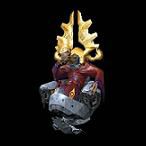
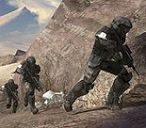
Political Analysis of the UNSC and the Covenant
Note: Position charts used in this article are © Political Compass.
Most Halo fans have diverging opinions on the political
behavior of certain groups in Halo fiction. Because of the fact that
humanity is engaged in a bitter war with the fanatic Covenant, popular
opinion usually drifts towards the thesis that the UNSC (and UEG) are
fascist and extremely authoritarian - the next worst thing to the types of
fascism we've seen during World War II. As much as some evidence in Halo
canon supports that assumption, current-day social and economic political
parameters do not. While I'm aware of the fact that these assumptions are
generally made by people who simply want to enjoy Halo fiction disregarding
larger, more complex elements within it, they've grown to the point where
they've become stereotypes which simply aren't entirely accurate.
That's why I headed to the
Political Compass (a quiz that
tells you where you stand politically) and filled in the propositions with
what I thought most closely resemble the UNSC/UEG's and the Covenant's
policies in Halo fiction.
Before we head on to the results, I'd like to present my
understanding of the UNSC/UEG and the Covenant political functions:
The UNSC/UEG:
- Economically, the UNSC/UEG
is a semi-collectivist society, restricting
the development of large-scale monopolies but not restricting
private property and private initiative and the free market.
- Socially, while
advocating a strong government and military,
the UNSC/UEG doesn't intervene in the basic social aspects of its
citizens the way fascist authoritarians might. The UNSC/UEG takes on
a moderate stance on criminal punishment in respect to civilians,
while occupying an extremely authoritarian position towards UNSC
military personnel (death punishment is allowed in case the Cole
Protocol isn't followed to the letter, for instance).
The Covenant:
- Economically, the Covenant respects basic
free market doctrines: the existence of private enterprises separate
from the military and statist wings, especially supporting the higher
aristocratic economy.
- Socially, the Covenant holds a much more
extreme and authoritarian stance than the UNSC. Its fanatic
religiousness, coupled with extreme social intervention on the part of
the Prophets and higher military class, drastically restrict free will,
freedom of speech, and possibly, freedom of whatever the Covenant
version of the press would be. Its extreme stance functions both toward
non-military and military personnel.
Now a few words about the political
Left and Right for those of you who might not grasp the definitions too
well, so you can understand the UNSC/UEG's and the Covenant's positions a
little better. If you do already, simply scroll down and ignore this part:
The Left: Advocates a state-controlled and collectivist (socialist) economy based on public ownership of the means of production and manufacturing and industrial corporations. The Left intensely regulates economic growth in order to adjust to society's needs as a whole. The Right: Advocates private ownership of the means of production and free markets (economic liberalism). The Right generally does not tolerate state and government intervention and regulation of the economy.
The Left: Advocates a state-controlled and collectivist (socialist) economy based on public ownership of the means of production and manufacturing and industrial corporations. The Left intensely regulates economic growth in order to adjust to society's needs as a whole. The Right: Advocates private ownership of the means of production and free markets (economic liberalism). The Right generally does not tolerate state and government intervention and regulation of the economy.
Now that those annoying explanations are out of the way, you can proceed to the core of my undertaking: the UNSC/UEG and Covenant's position on social and economic matters. Note: the horizontal Left-Right line defines the economic position (far left: communism, far right: extreme liberalism), while the vertical line defines the social position (libertarianism: anarchism, authoritarianism: fascism).
After I hit the "Let's see where you stand" button at the end of the quiz, this is what I got for the UNSC/UEG:
(I've also included some real-life political figures to better communicate the political environment the UNSC/UEG occupies.)
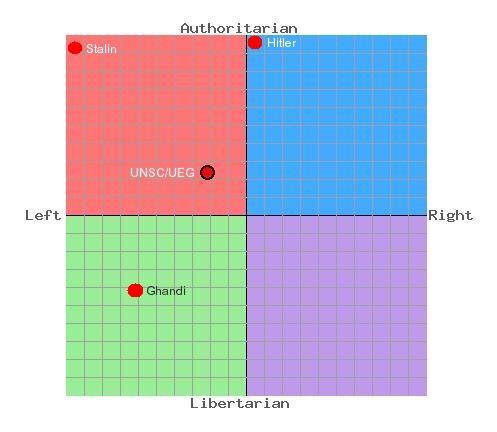
Interesting, isn't it? The UNSC/UEG is placed on the
center-left, with a barely noticeable authoritarian marking. Does the result
correctly reflect my understanding of the UNSC/UEG's political functions
before I took the quiz? I think it does: the UNSC is moderately
collectivist, practicing only minor social intervention towards civilians. Hardly
a fascist attitude! Hitler's fascism is all the way up there.
Of course, during the Human-Covenant War, the UNSC's
position may change - like being pushed a bit further up the authoritarian
scale and a bit further to the left.
Now, this is what I got for the Covenant:
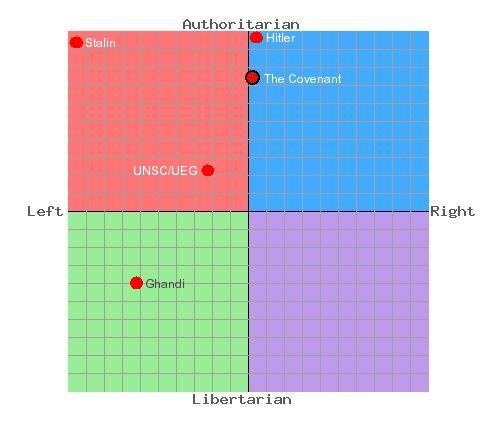
Hitler and the Prophets sharing the same general ideology?
That's nuts! Wait, not it's not. Think it through for a minute: Hitler's
Nazism advocated a strong religious identity in his early days - so does the
Covenant. Hitler was an avid anti-pacifist - the Covenant is practically
completely militarist in nature, going so far as to ignore civil freedoms
entirely. Fascism encourages social differences and the so-called "Fuhrerprinzip"
- the Covenant contains masters and slaves, in the most straightforwardly
sense, where the masters are encouraged to beat their slaves if they don't
work up to their expectations. That's hierarchal violence, something
Mussolini, if my historical knowledge serves me right, was nuts about. So
you were saying the UNSC was fascist? Take a look at that picture one more
time and assess the political environment.
Now I've moved to a much less-known faction in Halo fiction:
the rebels, or "Insurrectionists." Not much is known about the various rebel
organizations in the Halo universe, however, I've done
some
investigations which point to the fact that, at least the
Insurrectionists in the Epsilon Indi System, are socialist-oriented.
However, Halo: The Cole Protocol reveals that the rebels in The
Rubble violently reject UNSC/UEG authority over the colonies (calling it a
"fascist" government), most often resorting to terrorist/guerrilla
actions to further their goals, which leads me to believe that they're not entirely
happy to embrace an authoritarian ideology. Therefore, I've combined
elements of socialist authoritarianism with socialist libertarianism when I
took the quiz to see where they fit. This is what I got:
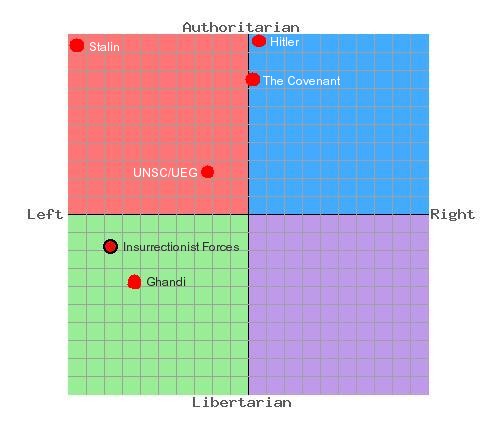
It certainly looks like they're pushing towards a form of less
radical communism on the far left. However, their position is anything but accurate with
such little information in canon. There's not that much of a difference
between the UNSC and the Insurrectionists, neither economic nor social.
They're still waging war on each other, though.
The next faction I've approached is the Forerunner. Although
next to nothing is known about the Forerunners' social and economic aspects,
their dedication to a strong military and a very organized structure,
combined with their apparent democratic lifestyle in the military, gives
them an almost socialist appearance. Again, those are simply my ideas of
what the Forerunners are like - the result may or may not please you.
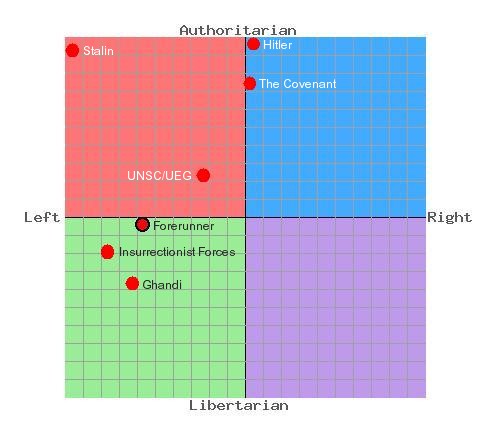
Finally, I've put together a chart only containing the most important factions in Halo
fiction, excluding real-life figures (I instead put up pictures of them in
their respective areas) based on the results I got in the Political Compass
test. The Koslovics and the
Friedens' positions are ENTIRELY speculative, however, following the train
of thought that after 150 years since the fall of the Soviet Union,
communism took a slightly less radical form leading to "neo-communism."
Likewise, the neo-fascist Frieden may have likely relaxed its authoritarian
position, and moved slightly more to the right, thus allowing more economic
freedom than old fascism did. The opposing thesis - that neo-communism and
neo-fascism are actually revolutions aimed to recreate the original
doctrines of communism and fascism - is very plausible, but I found the
first theory is more likely to represent the true evolution of the two
ideologies.
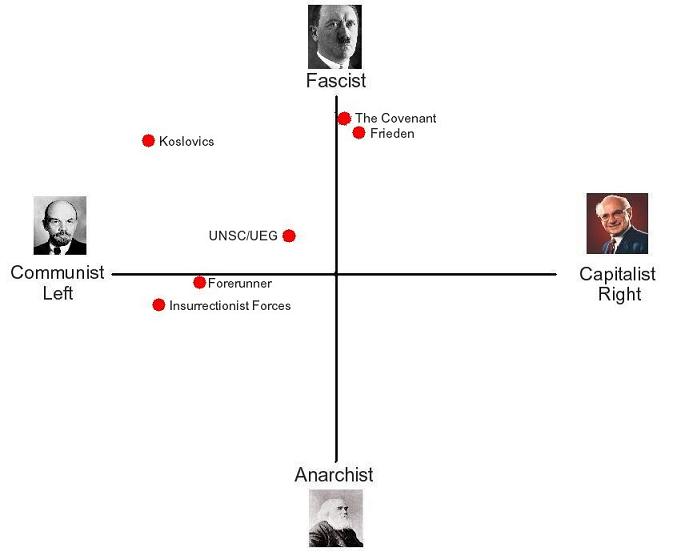
To aid your understanding of the political positioning, I've
put together a one-dimensional left-right axis of political ideologies
together with the rough position of the factions in Halo based on the
results in the Political Compass test.
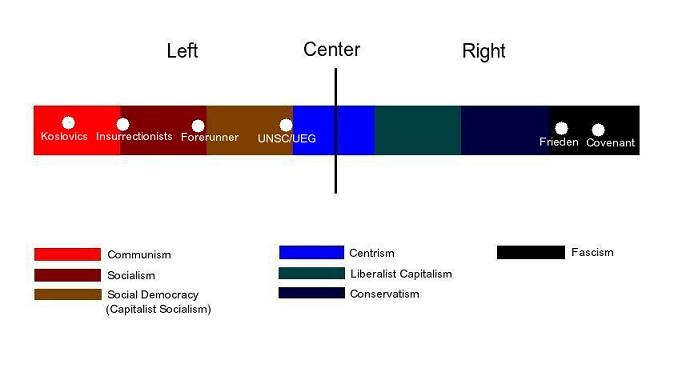
Most of the right in the Halo universe is empty; the
far-right, however, with its more collective nature, still seems to appeal
to some factions.
To view the answers I filled in the Political Compass test for
each Halo faction, click
here.
(Note: The answers for the Covenant are missing because I didn't record
them. To be completely frank, I did the test for the Covenant out of fun,
not considering I'd put this page together. However, most, if not all, of
the Covenant's views on religion, racism, societal behavior and the military
are extreme, oscillating only between "Strongly Agree" and "Strongly
Disagree".)
All these examinations, however, are based on my OWN understanding of
the Covenant, the UNSC and other factions. Anyone can take the quiz at the Political
Compass; so if you're not convinced the results I received are accurate, I
encourage you to take the quiz yourself and attempt to retrace my steps. All
you need is a decent understanding of Halo canon and its backstory.
If you have any questions regarding this page, please email us.
Position charts used in this article are © Political Compass.
Article written by UNSC Trooper.